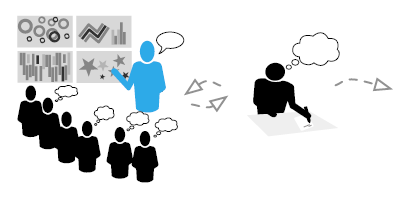Abstract
Applied visualization researchers often work closely with domain collaborators to explore new, useful, and interesting visualization applications. The early stages of collaborations are typically time consuming for all stakeholders as researchers piece together an understanding of domain challenges from disparate discussions and meetings. A number of recent projects, however, report on the use workshops to accelerate the early stages of applied work, eliciting a wealth of requirements in a few days of focused work. Yet, no guidance exists for how to use such workshops effectively. This dissertation's primary contribution is a framework --- created through the meta-analysis of 17 workshops in 10 visualization contexts --- that describes how and why to use workshops in the early, formative stages of applied work. The framework: 1) describes characteristics of effective workshops; 2) identifies a process model for using workshops; 3) describes a structure of what happens within effective workshops; 4) recommends 25 actionable guidelines for future workshops; and 5) proposes three example workshops as a starting point for researchers who are interested in using workshops in future projects. The creation of this framework exemplifies the use of critical reflection to learn about visualization in practice from diverse studies and experience.
The framework is grounded in two formative design studies that provide this dissertation's secondary contributions. In the first formative design study, we worked with defense analysts focused on improving the safety of military vehicles. From this design study, we contribute task analysis, data abstraction, and a validated visualization tool for the visual analysis of spatial and nonspatial ballistic vulnerability data. In the second formative design study, we worked with neuroscientists focused on retinal connectomics. From this design study, we contribute two new visualization techniques and a prototype system for visualizing connectivity in large graphs. Our experiences in these two design studies motivated and informed this dissertation's primary contribution.
Citation
Ethan Kerzner
A Framework for Creative Visualization-Opportunities Workshops
Advisors: Miriah Meyer, Alexander Lex, Jason Dykes, Charles Hansen, Erik Brunvand
University of Utah, PhD Thesis, May 2019.
Best Dissertation Award by the School of Computing, University of Utah
BibTeX
@phdthesis{2019-thesis-kerzner,
title = {A Framework for Creative Visualization-Opportunities Workshops},
author = {Ethan Kerzner},
school = {University of Utah},
month = {May},
year = {2019}
}
